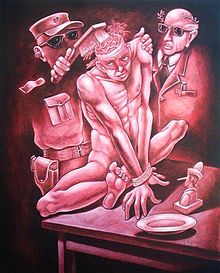Mind control
Mind control (also known as brainwashing, coercive persuasion or thought control) means trying to control other people's beliefs and behaviours.

In this process, a person or group persuades others to change their basic beliefs and values.[1] They may use unethical methods and manipulation, which often harms the people being manipulated.[2]
The term has been applied to any tactic which damages an individual's control over their own thinking, behaviour, emotions, or decision-making.
Theories about brainwashing and mind control were originally developed to explain how totalitarian regimes indoctrinated prisoners of war using propaganda and torture.
History
changeAccording to some authors, ideas about mind control can be found in all stages of human history.[3]
Korean War
changeAccording to the Oxford English Dictionary, the word "brainwashing" first appeared in a Miami News article on 7 October 1950.
The article's author, Edward Hunter, worked as a journalist and a United States intelligence agent during the Korean War. He wrote a series of books and articles about Chinese brainwashing.[4]
The Chinese term 洗腦 (xǐ năo, literally "wash brain")[5] originally described methods used by Mao Zedong's regime in China. Their purpose was to change a person's mindset so they became a "right-thinking" member of the new Chinese social system.[6]
Unlike in earlier wars, a relatively high percentage of American GIs defected to the enemy side after becoming prisoners-of-war. Hunter and others thought that brainwashing explained this.
Two former prisoners of war, British radio operator Robert W. Ford[7][8] and British Army Colonel James Carne, claimed the Chinese tried to brainwash them during their imprisonment.
In a famous case, an American prisoner of war named Frank Schwable was tortured until he falsely confessed that he participated in germ warfare.[9]
Cults and the shift of focus
changeAfter the Korean War, mind control theories shifted in focus from politics to religion. New religious movements started to emerge in the 1960s.[10] More and more young people converted and joined them. Some of these converts suddenly changed their beliefs and behaviors; in some cases, they neglected or broke contact with their loved ones. People in the anti-cult movement said these sudden converts had been brainwashed.[11][12][13]
The media quickly began to report this theory.[14] Social scientists sympathetic to the anti-cult movement, who were usually psychologists, developed more sophisticated models of brainwashing.[12] While some psychologists were agreed with these theories, most sociologists doubted that mind control could explain why people converted to new religious movements.[15]
References
change- ↑ Kowal D.M. 2000. Brainwashing. In A.E. Kazdin (ed) Encyclopedia of psychology, vol. 1 (pp. 463-464). American Psychological Association. doi:10.1037/10516-173
- ↑ Langone, Michael. "Cults: Questions and Answers". www.csj.org. International Cultic Studies Association. Archived from the original on 2016-08-03. Retrieved 2009-12-27.
Mind control (also referred to as 'brainwashing,' 'coercive persuasion,' 'thought reform,' and the 'systematic manipulation of psychological and social influence') refers to a process in which a group or individual systematically uses unethically manipulative methods to persuade others to conform to the wishes of the manipulator(s), often to the detriment of the person being manipulated.
- ↑ Sargant, William 1957. Battle for the mind: a physiology of brain-washing. London: Heinemann. Especially: Chapter 8 Brainwashing in ancient times, by Robert Graves.
- ↑ Marks, John (1979). "8. Brainwashing". The search for the Manchurian Candidate: the CIA and mind control. New York: Times Books. ISBN 0-8129-0773-6. Retrieved 2008-12-30.
In September 1950, the Miami News published an article by Edward Hunter titled '"Brain-Washing" tactics force Chinese into ranks of Communist Party.' It was the first printed use in any language of the term "brainwashing," which quickly became a stock phrase in Cold War headlines. Hunter, a CIA propaganda operator who worked under cover as a journalist, turned out a steady stream of books and articles on the subject.
- ↑ Chinese English Dictionary
- ↑ Taylor, Kathleen (2006). Brainwashing: the science of thought control. Oxford: Oxford University Press. p. 336. ISBN 978-0-19-920478-6.
- ↑ Ford RC (1990). Captured in Tibet. Oxford: Oxford University Press. ISBN 0-19-581570-X.
- ↑ Ford RC (1997). Wind between the worlds: captured in Tibet. SLG Books. ISBN 0-9617066-9-4.
- ↑ New York Times: "Red germ charges cite 2 U.S. Marines," February 23, 1954, accessed February 16, 2012
- ↑ Barrett D.V. 2001. The new believers: a survey of sects, cults and alternative religions . London: Cassell. [1]
- ↑ Melton, J. Gordon (1999). "Brainwashing and the cults: the rise and fall of a theory". CESNUR: Center for Studies on New Religions. Retrieved 2009-06-15.
In the United States at the end of the 1970s, brainwashing emerged as a popular theoretical construct around which to understand what appeared to be a sudden rise of new and unfamiliar religious movements during the previous decade, especially those associated with the hippie street-people phenomenon.
- ↑ 12.0 12.1 Bromley, David G. (1998). "Brainwashing". In William H. Swatos Jr. (ed.). Encyclopedia of Religion and Society. Walnut Creek, CA: AltaMira. pp. 61–62. ISBN 978-0-7619-8956-1.
- ↑ Barker, Eileen: New religious movements: a practical introduction. London: Her Majesty's Stationery office, 1989.
- ↑ Wright, Stewart A. (1997). "Media coverage of unconventional religion: Any 'Good News' for minority faiths?". Review of Religious Research. 39 (2): 101–115. doi:10.2307/3512176. JSTOR 3512176.
- ↑ Barker, Eileen (1986). "Religious movements: cult and anti-cult since Jonestown". Annual Review of Sociology. 12: 329–346. doi:10.1146/annurev.so.12.080186.001553.